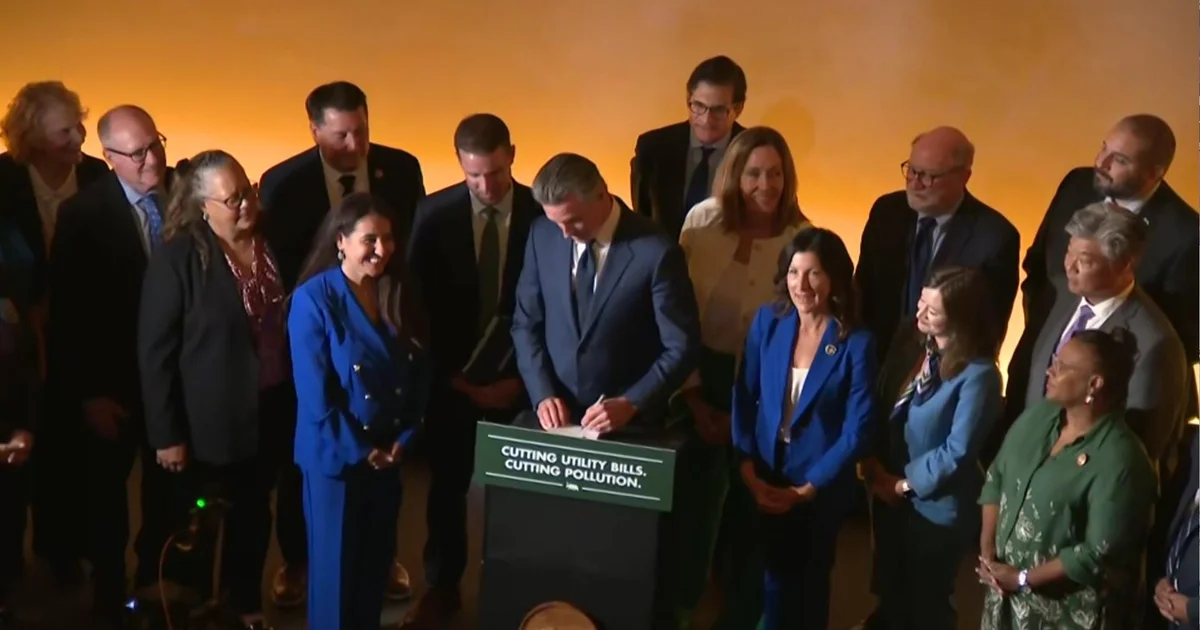
California Gov. Gavin Newsom signed a sweeping package of bills on Friday charting the state’s continuing transition to green energy, which includes an extension of the state’s landmark cap-and-trade program.
The slate of six bills seeks to address energy affordability, the stabilization of petroleum markets, and reducing air pollution as part of California’s acceleration toward a green job-generating economy. A statement from the Governor’s Office said California’s action comes as the Trump administration continues “to gut decades-old, bipartisan American clean air protections and derail critical climate progress.”
The bills, which Newsom signed at the Morrison Planetarium at the California Academy of Sciences in San Francisco on Friday, were approved with bipartisan support in an extended session of the California legislature last weekend. They represent a balancing act in managing the transition from fossil fuels to green energy amid the challenge of climate change, while keeping energy costs manageable for consumers.
“After months of hard work with the Legislature, we have agreed to historic reforms that will save money on your electric bills, stabilize gas supply, and slash toxic air pollution — all while fast-tracking California’s transition to a clean, green job-creating economy,” Newsom said in a prepared statement.
Newsom said legislation will bring down electricity costs for Californians by providing up to $60 billion in electricity bill refunds through an expanded California Climate Credit. The legislation also aims to make energy more affordable by accelerating critical clean energy projects and expanding regional energy markets to improve grid reliability.
California has positioned itself as leading the nation on the transition to green energy, but has also faced headwinds from the petroleum industry, the federal government, and the costs associated with the transition. After the state enacted a ban on the sale of new gas-powered cars by 2035, the Trump administration blocked it, prompting a lawsuit by the state. High gas prices and the move by petroleum companies to close refineries in the state have threatened to send prices even higher.
One bill eases regulations on oil production in Kern County in a change the Governor’s Office calls “targeted, locally-led, environmentally responsible” to boost the state’s fuel supply while protecting the ongoing transition away from fossil fuels. The signing of SB 237 brought rare praise from the Western States Petroleum Association, which historically has strongly opposed the state’s aggressive climate policies.
“Governor Newsom’s leadership on SB 237 was foundational for the renewed partnership with the oil and gas industry,” the WSPA said in a prepared statement. “We look forward to continuing our relationship focused on realistic policies that balance environmental and economic goals to ensure California and the Western States have access to the affordable fuels they need.”
Another bill extends the state’s cap-and-trade program to 2045. The program puts a cap on emissions from large polluters that gets lowered over time. Companies can then sell credits for polluting less to other companies, allowing them to reduce emissions while providing flexibility in how the limits are met. The program is now known as “cap-and-invest” to highlight that the money raised is reinvested back into the state to fund projects on climate, housing, and transportation.
“Public transportation delivers for the environment and economy by providing Californians with travel options that reduce emissions, relieve congestion, cut household expenses, and sustain middle class jobs,” said California Transit Association executive director Michael Pimentel in a prepared statement. “By reauthorizing the Cap-and-Invest program and preserving the state’s climate investments in building and operating our public transit systems, these bills will ensure that communities across the state experience the benefits of California’s nation leading environmental policies.”
The package also updates California’s Wildfire Fund, the $21 billion insurance pool that helps utilities cover wildfire liabilities and avoid bankruptcy. It adds another $18 billion — financed jointly by utility shareholders and ratepayers — while requiring utilities to put in billions more of shareholder money to harden and modernize their equipment.
Some analysts and environmental groups say that Newsom and the state legislature have not yet found the right balance between the state’s climate goals and the continued reliance on fossil fuels.
Asha Sharma, state policy manager with the Leadership Counsel for Justice and Accountability, told KQED that the legislation doesn’t address pollution for Californians who live near refineries.
“We have a real responsibility to ensure that the fourth largest economy in the world, a progressive leader on climate, is really committed to not only climate policies, but ensuring that they’re deployed equitably,” Sharma told KQED.
Advocacy group Consumer Watchdog went further, calling the claims made by the Governor’s Office “a sham.”



